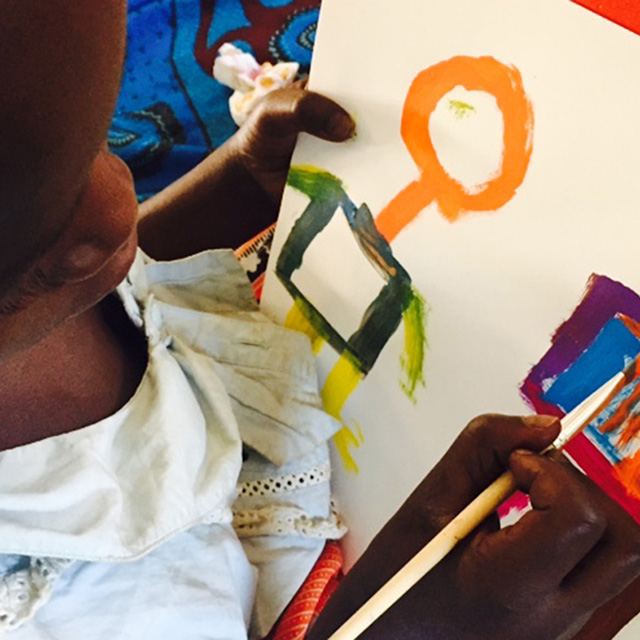Bringing hope to millions: Transforming access to pediatric sickle cell care in Africa
As of 2023, an estimated 7.7 million people are living with sickle cell disease (SCD) globally. More than 80% of those people reside in sub-Saharan Africa. A lifelong, inherited disorder, SCD is associated with childhood strokes, unbearable pain episodes and anemia, and it’s currently one of the leading causes of childhood illness and death in sub-Saharan Africa.
However, the potential exists to dramatically alter health outcomes and reverse this devastating tide by implementing simple yet lifesaving measures, and that is what the Bristol Myers Squibb Foundation (BMS Foundation), an independent charitable organization, and its partners are working to do.
Building off of a 25-year partnership that has had a profound impact on public health in sub-Saharan Africa, the BMS Foundation, Baylor College of Medicine Global Health and Texas Children’s Global HOPE program have joined together to transform pediatric SCD care in the region.
The initiative, launched in October 2024 and supported by a grant from the BMS Foundation, focuses on building local healthcare capacity and integrating lifesaving SCD interventions into primary health services for populations that have limited access to care.
The program is also training local health workers and supplementing medical supplies. By integrating these services into existing healthcare frameworks and training local health professionals, the SCD program aims to build sustainable, long-term impact.
“Families in sub-Saharan Africa know the devastating impact of sickle cell disease all too well,” said Catharine Grimes, president of the Bristol Myers Squibb Foundation. “For people living outside of major urban centers, finding care is a significant challenge and sometimes not even possible. Our new initiative is integrating lifesaving early-stage interventions into primary care in non-urban areas.”
Dr. Joseph Lubega (Texas Children’s Hospital), Catharine Grimes (Bristol Myers Squibb Foundation), Dr. Dithan Kiragga (Baylor College of Medicine Children’s Foundation – Uganda), Michael Mizwa (Baylor College of Medicine and Texas Children’s Hospital and Dr. Nmazuo Ozuah (Texas Children’s Hospital) outside Children’s Clinical Centre of Excellence in Uganda. Photo credit: Texas Children’s Hospital
With initial launches in Tanzania and Uganda, where most of the population lives in rural areas, this initiative is part of a phased approach to build a broader pan-African program. Recognizing the key role of continental institutions and locally-led solutions, Global HOPE has advanced discussions to work in partnership with the Africa Centres for Disease Control and local ministries of health respectively – a landmark collaboration to build local capacity and deliver care in the communities where it is needed most.
“Together with colleagues and partners in Africa, we have resolved to depart from the status quo by integrating interventions into the existing primary health systems to rapidly scale up, save resources and lives,” said Dr. Joseph Lubega, director of Texas Children's Global HOPE Program. “This is the beginning of bringing an end to thousands of years of intolerable pain, disability and tragic deaths because of sickle cell disease across Africa. These children and families cannot wait any longer.”
The new initiative to address SCD marks the next phase of decades of joint efforts between the BMS Foundation, Baylor College of Medicine Global Health and Texas Children’s Hospital to improve children’s health in sub-Saharan Africa.
In 1999, the three organizations mobilized a response to HIV/AIDS at the height of the epidemic, providing care for more than 396,000 mothers and children across the region. This collective effort helped transform pediatric HIV and AIDS from an acute health crisis to a manageable chronic disease in some countries through improved healthcare system capacity, training tens of thousands of local healthcare workers and working with other independent organizations that operate in partnership with governments to deliver care.
Texas Children’s leveraged these partnerships and launched the Global HOPE Program in 2016 – supported by funding from the BMS Foundation – to address the unconscionable suffering and mortality of children with cancer and blood diseases in the region. Global HOPE has trained 35 pediatric cancer and blood disease specialist doctors and 180 pediatric cancer nurses across east and southern Africa, providing specialist care for about 2,500 children diagnosed with cancer every year at 12 tertiary centers in eight countries, treating more than 26,000 children with cancer, SCD and blood disorders to date.
Through strategic collaborations and sustainable solutions, the BMS Foundation strives to create lasting impact in regions of the world that are medically underserved and heavily burdened. With its new game-changing initiative alongside longtime partners, the BMS Foundation is catalyzing critical steps to address one of the most pressing health challenges facing sub-Saharan Africa – and bringing hope to millions of families affected by this devastating disease.
